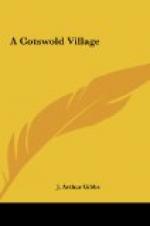“The proper study of mankind is man,”
thought Fleet Street the most interesting place on the face of the earth; and perhaps he was right. Let us hear what he has to say about this halo of old association: “To abstract the mind from all local emotion would be impossible if it were endeavoured; and would be foolish if it were possible. Whatever withdraws us from the power of our senses; whatever makes the past, the distant, or the future predominate over the present, advances us in the dignity of thinking beings. Far from me and from my friends be such frigid philosophy as may conduct us indifferent and unmoved over any ground which has been dignified by wisdom, bravery, or virtue.”
This, then, is the difference between the plains of Africa and the hills and valleys of England. The one is at present a vast inhospitable chaos, the other a land in which there is scarcely an acre that has not been dignified by wisdom, bravery, or virtue. Such are the signs by which we are to distinguish Cosmos from Chaos.
How far into the Cotswold Hills the halo of Stratford-on-Avon’s glory may be said to extend it is not easy to determine. Let us allow at all events that the reflection from the arc reaches across the whole extent of the wolds as far as Dursley. For here on the western edge of the Cotswolds it is probable that Shakespeare spent that portion of his life which has always been involved in obscurity—the interval between his removal from Warwickshire and his arrival in London.
On a fine autumnal evening in the year 1592 a horseman, mounted on a little ambling nag, neared the Cotswold village of Bibury. Both man and steed showed unmistakable signs of weariness. The horse especially, though of that wiry kind known as the Irish hobby, hard as iron, and accustomed to long journeys, evinced by that sober and even dejected expression of countenance so well known to hunting men, that he had been ridden both far and fast. The saddle too, as well as the legs, chest, and flanks of the nag, appeared wet and mud-stained, as if some brook had been swum or




